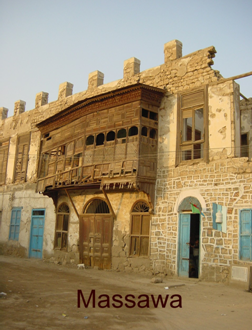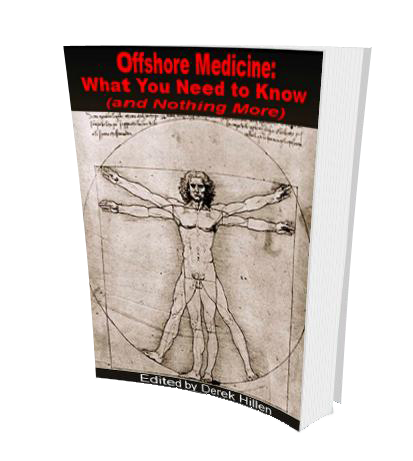- Boat
- Articles
- About
- Tehani-li Logs
- 2004
- Uligan Maldives
- Man, Oh Man, Oman
- Eritrea: The Nicest Place You’ve Never Heard Of
- Cruising Notes: Oman to Eritrea – From Pirates to Cappucinos
- Old Testament Sudan
- Egypt: Legend, Myth and Reality
- Thoughts on Cruising the Red Sea
- Greece: Civilization Again
- Montenegro
- Malta
- Sardinia, Italy
- Barcelona, Spain
- 2003
- 2002
- 2001
- 2004
- Contact
Eritrea: The Nicest Place You’ve Never Heard Of
We spent all our time in Eritrea in the port city of Massawa and made two trips to the pretty capital of Asmara. These two cities, although found in a small country that used to be part of Ethiopa and only 100 kms apart, are like two separate worlds.
Massawa has a hot, lowland climate, strong Muslim influence and is a dump, while Asmara, nestled high up in the mountains enjoying clear, cool air and sporting many sidewalk cafes feels like southern Italy. Eritrea itself is a tiny nation of 3.6 mn souls made up of nine different ethnic groups. The people are described as being “semitic” and are dark and thin, looking like a cross between Arabs and black Africans, I thought.
They are all very polite and retiring, almost mousey in some ways but carry themselves well and act with a dignity rarely found in the third world. (A complete opposite to the craven Egyptians, I was to find out later). With per capita GDP of around $600 and most of the population occupied by subsistence agriculture, this is one of the poorest countries in the world yet, surprisingly, theft is rarely a problem here and the streets are very safe. The people are clean and hospitable and we felt they were all pretty honest (a far cry from some of the other places visited on the trip).
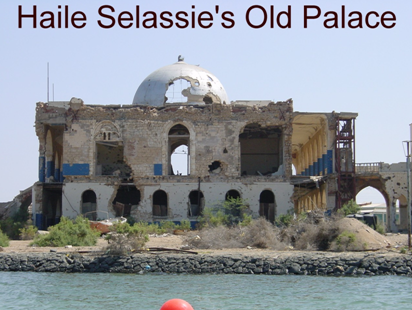
The country came to international prominence due its long independence fight with its much larger neighbor, Ethiopia. In fact, Ethiopia’s population at 65 mn is over 18 times greater than that of Eritrea. The problems, like all border issues in Africa, go back to the post-colonial shake out that occurred after World War Two.
Before the war, Italy invaded and occupied Eritrea and most of Ethiopia. Last to the party, the Italians felt they too should have a colony before it was too late and invested quite heavily in infrastructure and architecture during their 30 year occupation making Asmara “Piccola Roma” before they sided with the bad guys in WW2 and Mussolini consequently found himself strung up from a lamp post in Milan.
Following that debacle, the fate of tiny Eritrea fell into the hands of the Big Four (the same group that divided Berlin). They eventually decided that Eritrea should become Ethiopia’s 14th province and in 1950, for all intents and purposes, the country officially disappeared. The Eritreans were not happy about that and 10 years later, predictably a ‘Struggle for Independence’ began which was to become Africa’s longest running war and last 30 terrible years.
Even though Ethiopia had Soviet assistance in the form of weapons and advisors (Massawa was bombed by MiGs, see pictures), Eritrea eventually defeated its larger neighbor and declared itself independent in 1993. A massive effort at rebuilding the shattered economy and institutions began.
However, that was not to last as 5 years later Ethiopia and Eritrea went at it again. This time it was a stupid play of egos between the respective ruling morons of the two countries over a totally insignificant border town. Called “the Rubbish War” by locals, more than 20,000 Eritreans died needlessly. Considering the small size of the population that is a significant figure. In US population terms that would be like losing almost 3,000,000 Americans for Chula Vista. And for what? (“War. What is it good for? Absolutely nothing. Say it again…”).
Sadly, the buffoon that was responsible for this tragedy on the Eritrean side is still in control and has become your garden variety “PFL” – President for Life. Proving yet again that the group that wins independence is usually not the best group to govern the country (take a look at Mao’s sad record for China, or modern day Vietnam for example), Eritrea has unfortunately become a police state.
All oppositition is suppressed and people are not even allowed to leave the country. Of course, they do so ‘illegally’ and the country is suffering a massive brain drain, falling living standards, a collapsing currency, the whole nine yards. Not surprisingly, the economy is sliding and the population is getting poorer. How do you get poorer when per capita GDP is less than $2 a day? There is absolutely no construction going on either; no building whatsoever. Coming from Asia where everything is new or being built with construction cranes spiking up all over the horizon, it is a surprise to see Asmara which looks more like an old and chewed around the edges library.
You sometimes feel you are walking through just an archive of old buildings. There is absolutely no money coming into the country for investment as the gov’t has nationalized any and all large businesses. A Danish friend forgot the English word and was asking me what you call it when the government does that, “Theft,” I answered.
It is a sad story for a truly good people that fought and sacrificed so much over the last two generations to face this continual erosion of society and civil conduct. Dangerously, the “R” word is on the streets. We never felt threatened in any way but could detect that things under the surface are stirring. What is really boring about this is how predictable the end will be. Anyone who travelled in E.
Europe in the ’80s would recognize all the symptoms here again of a decrepit regime bereft of legitimacy clinging on to power with fangs bared until they are wiped away by the irresistible tide of history. Finally, as we were leaving it looked like the tense border situation with Ethiopia might yet again erupt into hostilities.
Now what were we up to amidst all this turmoil and intrigue? We had to replace the head gasket on the cylinder block of the main engine and were waiting for a gasket set coming by DHL from Florida (many thanks again to Mike and crew of “Complete Yacht Service” of Ft. Lauderdale!) so we had plenty of time on our hands.
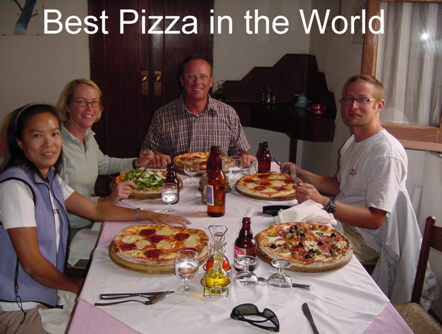
On our first trip to Asmara, we went with the Papagenas where we discovered “The Spaghetti and Pizza House,” and had the best pizza of my entire life. No exaggeration. The giant sandals in the photo symbolize the revolution and most people still wear them. Made of old tires, all the “fighters” wore these during the long “Struggle.” We had to say goodbye to our good friends, Tom, Polly and Hum on Papagena as they were in a hurry to return to a “normal” life in the UK and we had engine trouble; we weren’t going anywhere.
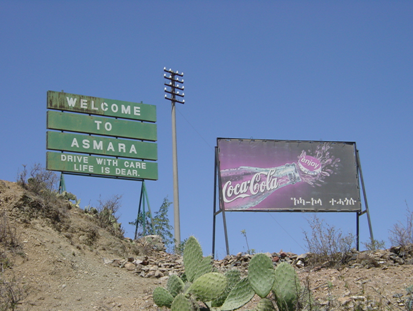
We really liked the pretty capital, Asmara. (See this post for more). The second trip there we stayed in the Ambassador Hotel for only $21 a night and it was right downtown where you want to be. For that price we had a large room overlooking the main Cathedral across the street and a separate bathroom and shower. The only fly in the ointment was the sink which came with a hole the size of a cantaloupe in the side where the maid had stuffed bunched up paper towels to stop it from leaking too much onto your feet. We saw this as a good sign: we must be able to buy paper towels here! Only those who live on boats realize how damn useful those things are and how hard they are to find!
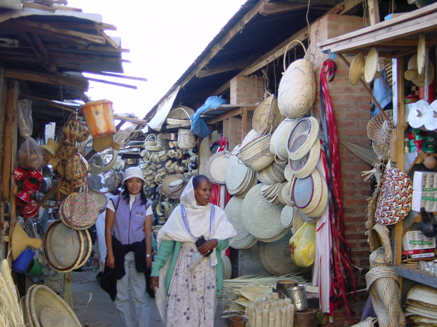
You can see the bombed out look to the buildings in Massawa and a strong Turkish influence in the architecture as Massawa was part of the Ottoman empire for a couple centuries. People still live in these ruins, by the way. Almost all of them have bullet holes all over the walls from the war with Ethiopia. Our agent and friend, Mike, lives in part of one of these old buildings with a small courtyard. He told us when Ethiopian troops were bombing Massawa he had 1,500 of his neighbors sheltering in the house and courtyard!
In many developing countries when you arrive with a yacht you are required to use an agent to check in. In Eritrea this was not so but Mike was there to help with getting fuel, water, DHL shipments, currency problems, in short – everything. He was a real life saver for us and very honest. We were invited to his house for traditional Eritrean coffee made by his wife, Ababa. First, after the charcoal is ready, incense is put on top to make the room fragrant while the roasted beans are ground up in a mortar and pestle, the pestle in this case being an iron bar.
Then the grounds are poured into the round clay pot with the long neck and little handle. Water is added and the pot placed back on the brazier. As it reaches a boil, Ababa would pour some out into another container and then pour it back into the pot. If you are in a hurry (and no one ever is) the whole process takes about 30 minutes. This must have been the way coffee was first made when it was discovered in Ethiopia right after the birth of Lucy.
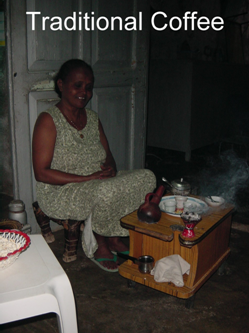
Although as different from Asmara as chalk and cheese, Massawa was also great for walking around. However, it was sometimes a bit rowdy then when all the bars finally close. Better yet, a stroll in the evening with the sun low on the horizon would show the ancient buildings made of coral blocks taking on a timeless golden glow reflecting their classical lineage and quiet confidence – confidence in the future we hope.
